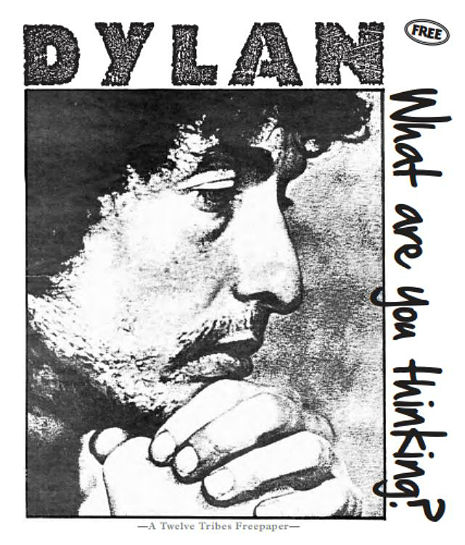Who are these apocalyptic ‘Twelve Tribes’ Jesus freaks following Bob Dylan around?
Source: Dangerous minds blog-09/10/2013
Have you heard about the Twelve Tribes group of “Amish-style” hippies—the men have beards, headbands, and ponytails and the women dress like Old West extras on Dr. Quinn, Medicine Woman—who have been following Bob Dylan’s tour around in a bus handing out a freaky 24-page ‘zine (“Dylan: What Are You Thinking?”) about how Dylan’s some kind of religious prophet?
The sect’s fascination with Dylan can be traced back to an incredibly strange interview he gave to SPIN magazine in 1985:
All that exists is spirit, before, now and forever more. The messianic thing has to do with this world, the flesh world, and you got to pass through this to get to that. The messianic thing has to do with the world of mankind, like it is. This world is scheduled to go for 7,000 years. Six thousand years of this, where man has his way, and 1,000 years when God has His way. Just like a week. Six days work, one day rest. The last thousand years is called the Messianic Age. Messiah will rule. He is, was, and will be about God, doing God’s business. Drought, famine, war, murder, theft, earthquake, and all other evil things will be no more. No more disease. That’s all of this world.
What’s gonna happen is this: you know when things change, people usually know, like in a revolution, people know before it happens who’s coming in and who’s going out. All the Somozas and Batistas will be on their way out, grabbing their stuff and whatever, but you can forget about them. They won’t be going anywhere. It’s the people who live under tyranny and oppression, the plain, simple people, that count, like the multitude of sheep. They’ll see that God is coming. Somebody representing Him will be on the scene. Not some crackpot lawyer or politician with the mark of the beast, but somebody who makes them feel holy. People don’t know how to feel holy. They don’t know what it’s about or what’s right. They don’t know what God wants of them. They’ll want to know what to do and how to act. Just like you want to know how to please any ruler. They don’t teach that stuff like they do math, medicine, and carpentry, but now there will be a tremendous calling for it. There will be a run on godliness, just like now there’s a run on refrigerators, headphones, and fishing gear. It’s going to be a matter of survival.
People are going to be running to find out about God, and who are they going to run to? They’re gonna run to the Jews, ‘cause the Jews wrote the book, and you know what? The Jews ain’t gonna know. They’re too busy in the fur business and in the pawnshops and in sending their kids to some atheist school. They’re too busy doing all that stuff to know. People who believe in the coming of the Messiah live their lives right now as if he was here. That’s my idea of it, anyway. I know people are going to say to themselves, “What the fuck is this guy talking about?” But it’s all there in black and white, the written and unwritten word. I don’t have to defend this. The scriptures back me up. I didn’t ask to know this stuff. It just came to me at different times from experiences throughout my life. Other than that, I’m just a rock ‘n’ roller, folk poet, gospel-blues-protestest guitar player. Did I say that right?
Uncle Bob’s yer prophet!
The New Yorker’s John Clarke noticed the Twelve Tribers (full name “The Twelve Tribes of the Commonwealth of Israel” ) at the Dylan show he attended and contacted the group. Clarke was told that joining the Twelve Tribes sect requires forsaking all material possessions, communal living, and working without monetary compensation in one of “the group’s cafés, stores, farms, or construction companies scattered across the United States.”
Writing about the “Dylan: What Are You Thinking?” publication, which alternately describes Dylan as a religious prophet before chiding him to make a return to the The Twelve Tribes/Commonwealth of Israel fold, Clarke says:
The most entertaining, and perhaps the most depressing, parts are the testimonials from members. “Bob” joined up because, as Dylan sings, “everybody has to serve somebody.” Another follower named “Thomas” discovered Dylan as a confused, pot-smoking teen-ager “going downhill fast.” He quotes from Dylan’s “My Life in a Stolen Moment” and “Masters of War,” and urges others to join: “You can come for a day or to stay. This is the answer that Dylan saw dimly. This is what he has wanted. Please come.”
Then there’s “Rose,” a lost teen who wandered around the country until she met and married a man who loved Dylan as much as she did. It was 1976, a year after “Blood on the Tracks” was released. “We clung to every word,” she writes. “The deep passion of our romance was radiated through every word Dylan uttered. It says in scripture that a cord of three strands is not easily broken. [Dylan] was our third strand.” At her first Dylan show, in Gainesville, Florida, she took LSD. “He had us in the palm of his hands,” she writes. “We were his.” Since that time, she has written to Dylan about the Twelve Tribes. At a show in Massachusetts, Rose managed to slip a note addressed to Dylan to someone in his entourage. That was in the late nineteen-eighties. She has yet to hear back. “We haven’t given up,” she writes.
The original mission of th
e Twelve Tribes dates back to 1987, when the group started following the Grateful Dead with a band of musicians, singers, and dancers, offering emergency medical care in venue parking lots. They also provided a place for lost friends to meet, and helped people coming down from bad acid trips. The author James McCallister ran into Twelve Tribes at a Grateful Dead show in 1990. “I viewed their seemingly predatory behavior as a vile cancer on the scene,” he said. “The operation seemed like a bear trap set in otherwise peaceful woods, a trap designed to ensnare those in vulnerable psychological states.”
In addition to following around Dylan’s endless tour, the Twelve Tribe “Peacemaker” bus has also dogged Phish, as well as Grateful Dead spin-off bands RatDog and Furthur.


